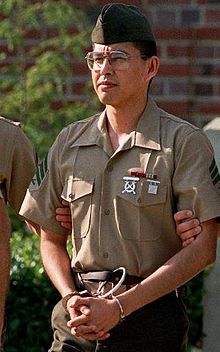- Clayton J. Lonetree
-
Clayton J. Lonetree (born 1961) is a member of the Navajo Nation who served nine years in prison for espionage.[1] During the early 1980s, Lonetree was a Marine Corps Security Guard stationed at the Embassy of the United States in Moscow.
Lonetree is the first US Marine to be convicted of spying against the United States.[2] Lonetree, who was stationed in Moscow as a guard at the US Embassy in the early 1980s, confessed in 1987 to selling documents to the Soviet Union. Lonetree was entrapped by a 25-year-old female Soviet officer named "Violetta Seina" [3]in that year (see Honeypot). He was then blackmailed into handing over documents when he was assigned to Vienna. These documents included the blueprints of the US Embassy buildings in Moscow and Vienna and the names and identities of US undercover intelligence agents in the Soviet Union. He was tried in a military court in Quantico, Virginia and convicted of espionage on August 21, 1987.
In May 1991, Lonetree filed an appeal, asking that his conviction be overturned because he had never learned the identity of one accuser, but this was denied. He initially received a 30-year sentence with a reduction in rank from E-5 to E-1, a fine of $5,000, the loss of all military pay and allowances, and a dishonorable discharge. The commandant of the Marine Corps, Gen. Alfred M. Gray, Jr., recommended to the Secretary of the Navy that Lonetree's sentence be reduced from 30 to 15 years in a letter written in 1989 that said that the effect of Private Lonetree's actions "was minimal." In addition, he said, the Marine's motivation "was not treason or greed, but rather the lovesick response of a naive, young, immature and lonely troop in a lonely and hostile environment." His sentence was reduced to 15 years, but he was released in 1996 after serving only nine years at the United States Disciplinary Barracks.
According to Time magazine:[4]
Marine Sergeant Clayton Lonetree, 25, was so highly regarded at his job as security guard at the U.S. embassy in Moscow that in November 1985 he was detached for special duty at the Reagan–Gorbachev summit in Geneva. Last week Lonetree sat in a brig at the Marine base at Quantico, Va., suspected by his superiors of helping the Soviet KGB filch classified U.S. documents from diplomatic offices in Moscow and Vienna. Lonetree, authorities said, had an affair with a female KGB agent who was reportedly working as a translator at the embassy.
He revealed the names of CIA personnel, detailed the work habits of embassy staff, and sketched the layout of the Moscow and Vienna embassy offices.[citation needed] The harsh sentence was given in light of serious security breaches at the embassy, some[specify] of which later were found to have been the result of the Aldrich Ames case.
References
General references:
Specific references:
- ^ R. C. S. Trahair (2004). Encyclopedia of Cold War Espionage, Spies, and Secret Operations. Greenwood Publishing Group. p. 171. ISBN 0313319553. http://books.google.com/books?id=tFJLIIGVk10C&pg=PA171&lpg=PA171.
- ^ "On This Day: August 21". The New York Times. http://learning.blogs.nytimes.com/on-this-day/August-21/. Retrieved 20 August 2011.
- ^ {{cite news|url=http://www.spymuseum.com/pages/agent-lonetree-clayton.html
- ^ "Semper Fie". Time. January 26, 1987. http://www.time.com/time/printout/0,8816,963330,00.html. Retrieved 2011-05-15.
Categories:- 1961 births
- Living people
- American people convicted of spying for the Soviet Union
- Fort Leavenworth
- United States Marines
- Navajo military personnel
Wikimedia Foundation. 2010.

